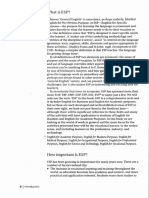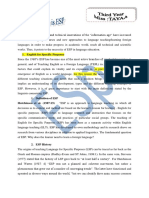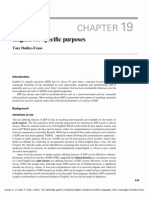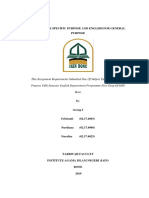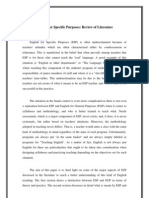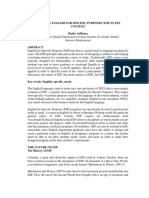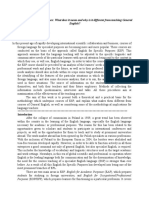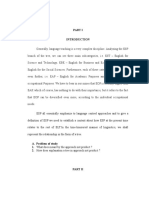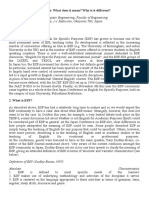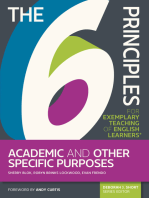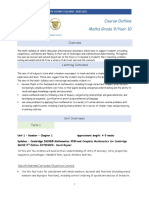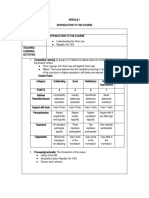419 - 07 Adrian BRUNELLO
419 - 07 Adrian BRUNELLO
Uploaded by
Azek NonovCopyright:
Available Formats
419 - 07 Adrian BRUNELLO
419 - 07 Adrian BRUNELLO
Uploaded by
Azek NonovOriginal Description:
Original Title
Copyright
Available Formats
Share this document
Did you find this document useful?
Is this content inappropriate?
Copyright:
Available Formats
419 - 07 Adrian BRUNELLO
419 - 07 Adrian BRUNELLO
Uploaded by
Azek NonovCopyright:
Available Formats
Didactic communication
ESP TEACHING AND THE ESP TEACHER – ARE THEY BETTER OR ARE
THEY JUST DIFFERENT?
Adrian BRUNELLO¹, Florina-Elena BRUNELLO²
¹Assist. Prof. PhD, „Apollonia” University of Iaşi, Romania
²Teacher of English, „Gheorghe Asachi” Technical College, Iaşi, Romania
Corresponding author: Adrian Brunello; e-mail: adrian_brunello@yahoo.com
Abstract knowledge. Authentic texts can be a real help,
The majority of Romanian high-school students who and patience, time and, why not, money is
study English need it for travelling, for business and some required. Of course, the English teacher has to
of them for pleasure. That is why they must be properly find out some information related to the students’
prepared and aware of the fact that they have to pay
attention to their English teacher. A teacher who teaches field of study, what they are interested in, but it
in vocational schools plays an important role in the life of is not necessary to become a teacher of a particular
the students because he must adapt the teaching style subject matter.
according to their needs. The teacher should use a mixture
ESP can be traced back to the end of the Second
between the ESP teaching style and the normal teaching
style. The important issue here is whether or not these World War in 1945 when the position of English
teaching styles present important differences and therefore language changed completely which was to play
being an ESP teacher represents a significant competitive a more practical role in the scientific and economic
advantage in today’s highly globalized society.
Keywords:English for special purposes, teaching techniques,
development occurring all over the world. This
general English teaching, ESP teaching. new situation created a new attitude towards
learning English in order to cope with the
1. INTRODUCTION currencies of technology and commerce. It could
be said that since the late 1980s, ESP has
established itself not only as an important and
We all know that English is an international distinctive branch of ELT, but has also
language and that nowadays our world has incorporated most of the work on discourse and
become dominated by technology and commerce. genre analysis, as well as the results of corpus
Tom Hutchinson and Adam Waters (1987) linguistics.
consider that English “created a new generation ESP teaching produces many problems, both
of learners who knew specifically why they were for learners and for teachers. These problems can
learning a language - businessmen and be divided into two categories: problems of
businesswomen who wanted to sell their methodology and materials, and problems of
products, mechanics who had to read instruction assessment and testing. All these issues can be
manuals, doctors who needed to keep up with solved; however, they require better teachers
developments in their field and a whole range of and better training. In order to make ESP teaching
students whose course of study included successful, teachers have to view ESP teaching
textbooks and journals only available in English” as a normal and acceptable challenge. Moreover,
(HUTCHINSON & WATERS, 1987). they need to understand as fully as possible the
In Romania, high-school teachers must take nature of the ESP teaching, they have to be able
into account the curricula given by the Romanian to observe and organize the learner’s progress
Ministry of Education when they prepare their and to diagnose his problems.
lessons and it is a pity that very often the Furthermore, teachers have to be familiar with
textbooks do not completely fulfil the needs of the widest possible range of alternative teaching
the teachers. Therefore, they must be adapted techniques, they have to be aware of the learning
according to the students’ needs and level of requirements and the learner’s needs. They have
International Journal of Communication Research 249
Adrian BRUNELLO, Florina-Elena BRUNELLO
to be optimistic and to know that success is consider that the roles of the teachers are related
possible; ESP teachers need to exercise both to assumptions about language and
professionalism based on training and experience. language learning at the level of approach. In
line with Richards and Rodgers, no one can claim
2. THE ROLE OF THE ESP TEACHER that ESP teachers should perform the same
activities in their different ESP classrooms. That
is, naturally speaking, as ESP classes are different
The ESP teacher’s role has many facets. Some
in terms of learners’ different purposes and
authors, such as Swales (1985), prefer to use the
different fields of study. Therefore, teachers are
concept of “ESP practitioner” rather than “ESP
required to have a variety of teaching activities
teacher,” due to the fact that it has a much more
in their classrooms according to their learners.
complex role in English language classroom.
Besides the traditional functions of the normal
3. THE STAGES OF ESP TEACHING
English teacher, the ESP teacher also deals with
aspects such as needs analysis, syllabus design,
materials writing or adaptation and evaluation. ESP teaching has developed through five
Another significant difference is represented by different stages. These can briefly be summarised
the fact that most ESP teachers have not been as following:
trained as such. Therefore, teachers have to
become familiar with new environments for A. Register Analysis
which, most of them, have very few notions This was the first phase in ESP teaching, and
about. it emerged between 1960s and early 1970s. It was
Comparing general English teaching with ESP mainly connected with the work of some linguists
teaching, we certainly notice both similarities like Peter Strevens (1964) and Jack Ewer (1969).
and differences. The difference is that many In this phase, it was assumed that ESP constituted
general English language teachers are trained to a specific register different from that of general
become teachers of English while the great English. The purpose of this approach was to
majority of ESP teachers are not trained as such. identify the grammatical and lexical features of
ESP teachers need, therefore, to orientate these registers. It could be said that the aim
themselves to a new environment for which they behind this approach was to make the ESP course
have not generally been prepared. Regardless of more relevant to learners’ needs, and to produce
the existence of this significant difference, as a syllabus which gave high priority to the
Jordan (1997) believes, ESP teachers obviously language forms that the students would meet in
have much in common with any language their science studies and vice-versa it would give
teacher. The ESP teacher needs to take account low priority to forms they would not meet. This
of developments in linguistics and learning approach showed that there is little linguistic
theory, aims to keep up with current views on justification for having highly specialized texts
the place of learners in the education system, and and, in addition, there is no clear relationship
has to confront the new technologies offered as between sentence grammar and specialization of
aids to improve pedagogy. What distinguishes, knowledge.
the ESP teachers from many teachers in the world
B. Discourse Analysis
of ELT, however, is the additional and crucial
need to understand, the requirements of other In this stage, the main assumption was that
professionals, either academic or occupational, the difficulties which students encounter appear
the differences in learning conditions in terms of not so much from a detective knowledge of the
both learners’ needs, age, etc. system of English, but from unfamiliarity with
Flowedew and Peacock (2001) argue that the English use. That is why the main concern of an
role of teacher will vary according to the type of ESP course was to identify the organizational
syllabus, course and the part of the world in patterns in texts and to specify the linguistic
which it takes place. Richards and Rodgers (2001) means by which these patterns would then form
250 Volume 8 • Issue 3, July / September 2018 •
ESP TEACHING AND THE ESP TEACHER – ARE THEY BETTER OR ARE THEY JUST DIFFERENT?NIGERIA
the syllabus of the ESP course. The pioneer of however, should not lead us to forget that ESP
this school was Henry Widdowson (1983). is an essential component of ELT, retaining its
emphasis on practical outcomes stemming from
C. Target Situation Analysis needs analysis, genre analysis and preparing
The aim of this movement was to take the learners to communicate effectively.
student’s existing knowledge and set it on a
scientific basis, by establishing procedures for 4. KEY FEATURES OF ESP TEACHING
relating language analysis more closely to
learners’ actual needs. This theory assumed that
the purpose of an ESP course is to enable learners Hutchinson and Waters (1987) consider that
to function adequately in a target situation, that needs analysis represents the most characteristic
is, the situation in which the learners will use the feature of an ESP course. Moreover, they
language they are learning, then the process of emphasize the importance of two types of
the ESP course design should follow by first analysis: the analysis of target situation needs
identifying the target situation and then carrying and the analysis of learning needs. The former,
out a thorough analysis of the linguistic features is concerned with the language use and the latter
of that situation. John Munby (1978), made a involves the language learning theory or the way
significant and an outstanding contribution to people learn the language. As a matter of fact,
develop this theory in his famous book ESP can simply be seen as an “approach” to
“Communicative Syllabus Design.” teaching English language. One way to
characterize ESP from general English is the
D. Skills-Centred Approach concept of register analysis which makes the ESP
This approach aimed at considering the course more relevant to learners’ needs. It can be
thinking process that underlies language use. argued that the ultimate goal of this process is to
The fundamental concept of this assumption is produce a syllabus that meets the learners’
that underlying all language use there are academic and professional needs.
common reasoning and interpreting processes, Often, ESP teachers have to put in a lot of
which regardless of the surface forms, enable us effort to become familiar with the language and
to extract meaning from discourse. Therefore, subject matter that they are about to teach. At
the main concern should be on the underlying times, teachers who were trained for General
interpretive strategies, which enable the learner English teaching may be confronted with texts
to cope with the surface forms. they know almost nothing about. The significant
question that appears here is whether or not the
E. A Learning-Centred Approach ESP teacher needs to understand the subject
Briefly, this approach goes up against all of matter of the ESP material. The first impulse
the phases presented above, which were all would be to say yes. If a teacher who teaches
based on descriptions of language use, since the literature has much information about the literary
main concern in an ESP course should be the texts and the authors he teaches, why should a
language learning and not the language use. different standard apply to the teaching of
All in all, ESP teaching should be seen not as Commerce, Tourism, Economics, Finance,
any particular language product but as an Management or Marketing? But, in order to come
approach to ELT governed by a specific reason up with a specific answer, one should take into
for learning. In this regard, Dudley-Evans and account aspects, such as the extent to which the
St. John (1998) theorize that ESP teaching has ESP materials are specialised, why it is difficult
generally been seen as a separate activity within for some teachers to understand the ESP subject
ELT, partly because it has developed its own matter and what kind of knowledge is required
methodology, and partly because it rests on of the ESP teacher.
disciplines other than applied linguistics, Analysing the content of ESP materials one
particularly second language teaching. This might say that there is little linguistic justification
openness to the insights of other disciplines, for having highly specialised texts. The discourse
International Journal of Communication Research 251
Adrian BRUNELLO, Florina-Elena BRUNELLO
structure of specialised texts may be denser and for teachers to have a positive attitude towards
more formalised, but it is not different in kind the ESP content, to know the fundamental
from that of less specialised materials. Of course, principles of the subject area, to be aware of how
there is a higher amount of specialised vocabulary, much they really know and to ask pertinent
but this does not make it more difficult to questions in order to enrich their knowledge.
understand. In fact, it may even be easier because The key to success is a meaningful teacher-
some terms and concepts have now become student communication in the classroom.
internationally well-known. Basically, the Although the teacher must have some information
difference lies in the subject knowledge and not about the subject matter of the ESP material, in
in the language knowledge. The use of highly the learning-centred approach students also play
specialised texts creates validity. They motivate a significant role, helping the teacher to acquire
learners because they are seen as relevant. But the basic knowledge about the subject.
the texts used have to represent elements of the Unlike General English, the status of ESP
learning process. The texts must also be handled changes from being a subject in its own right to
well by the teachers. ESP materials must take a service industry for other fields of study.
account of the teacher’s knowledge and Therefore, the ESP teacher encounters a series of
competence. They represent vital elements in the problems such as: low priority in timetabling;
teaching-learning process and must be able to lower status than subject teachers; isolation from
influence issues such as the choice of texts. One other English teachers; lack of respect from
strong point of the ESP teacher is that, unlike the students. However, this is not a general
General English teacher, he has the capacity and phenomenon. The shift from General English to
the power to influence syllabi and materials ESP results in a teacher more accountable to
according to his own capacities. others. Therefore, the ESP practitioner needs to
ESP teachers have difficulties understanding be a good negotiator. ESP teaching involves a
different ESP subject matters due to a number of close connection between the subject specialists
reasons: and the ELT teachers. It is assumed that the ELT
¾ ¾ The tradition in education of separating teacher can only be capable of dealing with ESP
Humanities and Sciences makes the ESP effectively if he has the active co-operation of
teacher to have very little information about subject teachers. Moreover, the ESP teacher may
the latter also have to struggle to master language and
¾ ¾ Some teachers are reluctant to learn new subject matter beyond the bounds of their
things and as they come to teach specialised previous experience, and he needs to understand
language only due to economic pressures, that ESP teaching should be carried out in
they do not present a great desire to improve collaboration with the subject area specialists. In
their knowledge on the new area this regard, Dudley Evan and St. John (1998)
¾ ¾ There has not been enough effort to retrain consider that this kind of teamwork can be
teachers categorized into three levels: co-operation,
¾ ¾ In ESP there is the tendency of expecting the collaboration and team teaching.
teachers to adapt to the requirements of the Co-operation here refers to gathering
target situation on their own information from the subject department about
All these considerations have made teachers the content of the course, the tasks required of
feel uncomfortable with the subject matter they students, the expectations of that respective
are expected to teach. On the contrary, teachers department and its related discourse community
should be encouraged to improve their about the nature of communication in the subject.
knowledge on the subject matter that they teach Collaboration, involves the mutual working of
and they have to be shown that specialised the ELT teacher and the subject specialist. That is
subject areas can, at times, even be appealing. to say, they work together outside the classroom
The idea is that ESP teachers do not have to to develop specific activities and tasks in ESP class
become specialists in the particular subject matter that run concurrently with the subject specialist
they are teaching. But it is extremely important to help the students to cope with the course.
252 Volume 8 • Issue 3, July / September 2018 •
ESP TEACHING AND THE ESP TEACHER – ARE THEY BETTER OR ARE THEY JUST DIFFERENT?NIGERIA
When it comes to team-teaching, the ELT 5. CONCLUSIONS
teacher and the subject specialist should act
simultaneously in the same classroom. It is worth
Students do not simply learn English because
mentioning that, the team-teaching approach can
they want to, but because they will certainly
be especially advantageous in teaching the need it in their future careers. Nowadays, English
productive skills (listening and speaking) where has become the most widely-spoken language in
the role of the ELT teacher is to prepare the job-related environments. Students need to have
material for the session in co-operation with the a good command of English not only because
subject specialist and to run the session, while they have to pass some school exams, but also
the role of the subject specialist refers to because they need to use it for work or future
monitoring and giving advice to clarify some studies.
points about the core of the subject and to ESP represents a learner-centered approach.
evaluate the students’ responses and contributions All teaching activities are triggered by the specific
in the discussion. Furthermore, the subject needs of the students. Therefore, when speaking
specialist should also be consulted in constructing about ESP, teachers should take into account
the examination questions. elements such as: needs analysis, material
Such cooperation should represent a two- development and its implementation or relevant
way process: the specialist helps the ESP assessment. It is advisable to actively involve
teacher in learning more about the learner’s students in the process of choosing the content
target situation. At the same time, the ESP materials, curriculum development and teaching
teacher makes the specialist more aware of the methodology. By doing so, teachers will gain
language problems learners (and the ESP completely committed and motivated students.
teacher himself) face. ESP practitioners play a number of different
The ESP teacher may also have to negotiate roles such as: teachers, course designers and
in a more physical sense. Cramped classrooms, material providers, collaborators, researchers
often in inconvenient locations, badly ventilated and evaluators. Moreover, the task of
or heated, with a great deal of outside noise, ESPpractitioners is highly challenging because
are only too common. The role ESP teachers they do not always know the content better than
are called on to play here is obviously one of their students. This is why ESP teaching requires
adaptability and flexibility. They need to be a very professional behavior on behalf of the
prepared to accept such conditions and to do teachers who must continuously enrich their
their best to improvise. The most important knowledge and stay up-to-date with the ongoing
way in which the ESP teacher becomes a research performed in the various fields of ESP.
negotiator is with regard to the learners,
themselves. Opposed to the General English References
teacher, the ESP teacher may be faced with a
DUDLEY-EVANS, T. & ST JOHN, M.J. (1998)
series of expectations regarding the nature,
Developments in English for specific purposes: an
content and achievements of the course. This interdisciplinary approach, Cambridge:Cambridge
situation is clearly present when we have University Press.
learners of different subject areas in the same EWER, J.R., & LATORRE, G. (1969) A Course in Basic
class. Although there is little justification for Scientific English, London: Longman.
having very specific materials, learners still FLOWERDEW, J. & PEACOCK, M. (2001) Research
demand them. Coping with the situation will Perspectives on English for Academic purposes,
Cambridge:Cambridge University Press.
be much easier if the ESP teacher tries to HALLIDAY, M.A.K., McINTOSH,A.& STREVEN, P.
understand why learners demand such (1964) The Linguistic sciences and language teaching,
materials and then they try to negotiate a London: Longman.
compromise: making learners more aware of HUTCHINSON, T. & WATERS, A. (1987) English for
their real needs and using enjoyable specific purposes. A learning-centred approach,
methodologies to distract attention and avoid Cambridge:Cambridge University Press.
any possible conflict.
International Journal of Communication Research 253
Adrian BRUNELLO, Florina-Elena BRUNELLO
JORDAN, R.R. (1997) English for academic purposes, SWALES, J. (1985) Episodes in ESP,Oxford: Pergamon
Cambridge: Cambridge University Press. Press.
RICHARD, J.C. & RODGER, T.S. (2001) Approaches and WIDDOWSON, H.G. (1983) Learning purpose and language
methods in language teaching,Cambridge:Cambridge use, Oxford:Oxford University Press.
University Press.
254 Volume 8 • Issue 3, July / September 2018 •
You might also like
- Literature Review & Training and DevelopmentDocument8 pagesLiterature Review & Training and DevelopmentShahzad SaifNo ratings yet
- Buku EspDocument123 pagesBuku EspLena Marliana HarahapNo ratings yet
- English For Specific Purposes & Roles of An ESP Teacher (Muhammad Younis Farid)Document5 pagesEnglish For Specific Purposes & Roles of An ESP Teacher (Muhammad Younis Farid)younis.farid100% (1)
- 1 - ESP IntroductionDocument6 pages1 - ESP IntroductionCinthia GonzalezNo ratings yet
- Esp and EgpDocument4 pagesEsp and EgpAnca IonescuNo ratings yet
- Lecturer, PHD," Constantin Brâncuși'' University of Târgu-JiuDocument4 pagesLecturer, PHD," Constantin Brâncuși'' University of Târgu-JiuAbdelhadi EsselamiNo ratings yet
- English For Specific Purposes: What Does It Mean? Why Is It Different? A. Growth of ESPDocument6 pagesEnglish For Specific Purposes: What Does It Mean? Why Is It Different? A. Growth of ESPMILCAH PARAYNONo ratings yet
- ESP Use To Teach VocabularyDocument39 pagesESP Use To Teach Vocabularyfatima zahra100% (2)
- (Nation .Citation NeededDocument32 pages(Nation .Citation Neededtitima1zouzouNo ratings yet
- Component of Curriculum Assessment and TestingDocument10 pagesComponent of Curriculum Assessment and TestingYusranNo ratings yet
- 1-Introduction To ESPDocument5 pages1-Introduction To ESPGhalia Nouni100% (1)
- Aplilingestic PDFDocument19 pagesAplilingestic PDFយ៉ែម សំអេងNo ratings yet
- The Paper of Introduction To EspDocument12 pagesThe Paper of Introduction To EspFoodLoverNo ratings yet
- Esp For NurseDocument10 pagesEsp For Nursefahrizakirani001No ratings yet
- English For Specific PurposesDocument6 pagesEnglish For Specific PurposesJhonBotiaNo ratings yet
- Assignment of ESPDocument6 pagesAssignment of ESPAqsa NomanNo ratings yet
- Esp - Session 1 - The Importance of EspDocument15 pagesEsp - Session 1 - The Importance of EspAzmi SwaggyNo ratings yet
- ESP Info For Final ExamDocument18 pagesESP Info For Final ExamMaría Sol TorresNo ratings yet
- ESP HandbookDocument24 pagesESP HandbookTch DanteNo ratings yet
- Teaching Foreign Language For Specific Purposes - Teacher DevelopmentDocument7 pagesTeaching Foreign Language For Specific Purposes - Teacher DevelopmentRicky SanjayaNo ratings yet
- What Are The Problems You May Face As An ESP Teacher?Document14 pagesWhat Are The Problems You May Face As An ESP Teacher?Chi HoangNo ratings yet
- ESP Module 1 Unit 4Document9 pagesESP Module 1 Unit 4Kristine YalunNo ratings yet
- Makalah ESPDocument10 pagesMakalah ESPica100% (1)
- Esp ProblemsDocument3 pagesEsp ProblemsSardi MohamedNo ratings yet
- Ch19-Nunan y Carter - EspDocument6 pagesCh19-Nunan y Carter - EspMichelle YlonenNo ratings yet
- Vocational School of Tourism Istiqomatul Mauludah: Key WordsDocument10 pagesVocational School of Tourism Istiqomatul Mauludah: Key WordsIndah Dwi CahayanyNo ratings yet
- Esp KLP 1Document8 pagesEsp KLP 1Sulfadli aliNo ratings yet
- English For Specific Purpose and English For General PurposeDocument9 pagesEnglish For Specific Purpose and English For General PurposeDiana NNo ratings yet
- Charles & Pecorari 2015 IntroductionDocument12 pagesCharles & Pecorari 2015 IntroductionMaria PsaltouNo ratings yet
- II. 6 Teacher Role CorrectedDocument5 pagesII. 6 Teacher Role CorrectedSardi MohamedNo ratings yet
- English For Specific Purposes Review of LiteratureDocument19 pagesEnglish For Specific Purposes Review of LiteratureAji Handoko100% (4)
- Esp Defining English For Specific Purpose and The Role of Esp PractitionerDocument5 pagesEsp Defining English For Specific Purpose and The Role of Esp PractitionerImam Syafi'i0% (1)
- QAU3049Document10 pagesQAU3049SakuraNo ratings yet
- 1384 3603 1 SMDocument9 pages1384 3603 1 SMvansNo ratings yet
- English For Specific PurposesDocument20 pagesEnglish For Specific PurposesSusan SantikaNo ratings yet
- 4-An Introduction To ESP LAMRI PDFDocument24 pages4-An Introduction To ESP LAMRI PDFKadek Angga Yudhi Adithya100% (1)
- English For Specific Purposes ArticleDocument8 pagesEnglish For Specific Purposes ArticleJAYSON GARGARITANONo ratings yet
- Module 1: Esp Overview: Lesson 1: History and DevelopmentDocument4 pagesModule 1: Esp Overview: Lesson 1: History and DevelopmentAris PetNo ratings yet
- Relevant Researches On The Use, Issues, and Challenges of ESP Teacher in The Teaching FieldDocument10 pagesRelevant Researches On The Use, Issues, and Challenges of ESP Teacher in The Teaching FieldEthyl PuyalesNo ratings yet
- Defining English For Specific Purposes and The Role of The ESP PractitionerDocument3 pagesDefining English For Specific Purposes and The Role of The ESP PractitionerAfida Mohamad AliNo ratings yet
- Course Code 5667Document30 pagesCourse Code 5667nobia jabeenNo ratings yet
- Contoh Essay ESPDocument19 pagesContoh Essay ESPAminuddin MuhammadNo ratings yet
- Tugas EspDocument16 pagesTugas Espsamsifriendly100% (15)
- ESP Uses, in Specific Teaching Situations, A Different Methodology Than That of General EnglishDocument1 pageESP Uses, in Specific Teaching Situations, A Different Methodology Than That of General EnglishGabyMatarNo ratings yet
- Definition of ESPDocument2 pagesDefinition of ESPRii Soeka SoekaNo ratings yet
- ESP EssayDocument5 pagesESP Essaykumar6133No ratings yet
- Esp PaperDocument10 pagesEsp PaperHena OktalianaNo ratings yet
- ESP - CH 1 - What Is ESP - The Origins of ESPDocument24 pagesESP - CH 1 - What Is ESP - The Origins of ESPShouqbe SaNo ratings yet
- Jo - Mc.Donough. ESP in Perspective A Practical Guide. London. Collin ELT. 1984. p.3Document6 pagesJo - Mc.Donough. ESP in Perspective A Practical Guide. London. Collin ELT. 1984. p.3Falihatul Kholidiyah100% (1)
- Lesson 1 The Nature of ESPDocument3 pagesLesson 1 The Nature of ESPlamislamis133No ratings yet
- Lesson 6 The ESP TeacherDocument3 pagesLesson 6 The ESP TeacherRaouf CarloNo ratings yet
- Problems in Teaching English For Specific Purposes (Esp) in Higher EducationDocument11 pagesProblems in Teaching English For Specific Purposes (Esp) in Higher EducationHasanNo ratings yet
- ESP Problems at Secondary Level in PakistanDocument8 pagesESP Problems at Secondary Level in PakistanMuzafar Ali NaichNo ratings yet
- Muhammad Refin ESP PTSDocument5 pagesMuhammad Refin ESP PTSRefinNo ratings yet
- ESP An Approach Not A Product-1Document5 pagesESP An Approach Not A Product-1Diah100% (1)
- Introduction To EspDocument4 pagesIntroduction To EspDraque TorresNo ratings yet
- English For Specific PurposesDocument3 pagesEnglish For Specific PurposesCarol SsqNo ratings yet
- The Differences and Similarities Between English For Specific Purposes (ESP) and English For General Purposes (EGP) TeachersDocument11 pagesThe Differences and Similarities Between English For Specific Purposes (ESP) and English For General Purposes (EGP) Teacherselena100% (1)
- Thinking About Going into Teaching ESL/EFL/ESOL?: Language Learning and Teaching, #1From EverandThinking About Going into Teaching ESL/EFL/ESOL?: Language Learning and Teaching, #1No ratings yet
- The 6 Principles for Exemplary Teaching of English Learners: Academic and Other Specific PurposesFrom EverandThe 6 Principles for Exemplary Teaching of English Learners: Academic and Other Specific PurposesNo ratings yet
- Kami Export - Emily Patterson - Terrible or TerrificDocument3 pagesKami Export - Emily Patterson - Terrible or TerrificemilyNo ratings yet
- Barrier GamesDocument2 pagesBarrier Gamesapi-341266067No ratings yet
- The Exam Coach 11 ISEB Common Pre-Test English Paper 1 Answering BookletDocument1 pageThe Exam Coach 11 ISEB Common Pre-Test English Paper 1 Answering BookletVishwa DesaiNo ratings yet
- Science Study Guide 2nd Grade II QUARTERDocument19 pagesScience Study Guide 2nd Grade II QUARTERJorge Mario RodriguezNo ratings yet
- Researchprojectcttopics Project CategoryDocument9 pagesResearchprojectcttopics Project CategoryProject ChampionzNo ratings yet
- FNP Personal and Professional Development PlanDocument13 pagesFNP Personal and Professional Development Planapi-525378665No ratings yet
- Values EducationDocument5 pagesValues EducationWisha CauilanNo ratings yet
- GR 9-IG Maths Syllabus Overview 2020-21Document7 pagesGR 9-IG Maths Syllabus Overview 2020-21George JeniferNo ratings yet
- Krishna Vocational CollegesDocument4 pagesKrishna Vocational CollegesSaras ChandraNo ratings yet
- Pyle & Danniels - 2017 - A Continuum of Play-Based Learning - RevisedDocument37 pagesPyle & Danniels - 2017 - A Continuum of Play-Based Learning - RevisedmawuenamayNo ratings yet
- Interview PreparationDocument2 pagesInterview Preparationnepalapp3No ratings yet
- List of Chennai City Pincode (Madras Postal Code / Zip Code)Document7 pagesList of Chennai City Pincode (Madras Postal Code / Zip Code)selvamNo ratings yet
- Mega 1Document2 pagesMega 1njenga geraldNo ratings yet
- Machine Learning in NewDocument13 pagesMachine Learning in NewViralmonsterNo ratings yet
- Clerk and CashierDocument2 pagesClerk and Cashierakhilabairi40No ratings yet
- Daily Lesson Log Creative Non-FictionDocument2 pagesDaily Lesson Log Creative Non-FictionMARIA VICTORIA VELASCONo ratings yet
- The Constructivist Turn in International Relations Theory: Jeffrey T. CheckelDocument19 pagesThe Constructivist Turn in International Relations Theory: Jeffrey T. Checkelain_94No ratings yet
- Mladen DolarDocument10 pagesMladen DolarAggelika PttNo ratings yet
- IT B.tech SyllabusDocument98 pagesIT B.tech SyllabusShreemaye DasNo ratings yet
- Lesson Plan in Grade 6Document4 pagesLesson Plan in Grade 6Jekoy BuloyNo ratings yet
- RizalDocument10 pagesRizalJojames GaddiNo ratings yet
- BPSM question bankDocument17 pagesBPSM question bank78seriibrahimNo ratings yet
- Samantha Charriez Senior Recital ProgramDocument8 pagesSamantha Charriez Senior Recital Programapi-347495545No ratings yet
- 4Q EnglishDocument6 pages4Q EnglishDanny LineNo ratings yet
- VALIDATION TESIS KwestyunerDocument4 pagesVALIDATION TESIS KwestyunerRommel GalbanNo ratings yet
- 2023 Frontline District PresentationDocument30 pages2023 Frontline District Presentationapi-339789222No ratings yet
- 2022 Mid Year Inset V.1Document6 pages2022 Mid Year Inset V.1Ghlends Alarcio Gomez100% (1)
- Professional ResumeDocument3 pagesProfessional Resumeapi-299184711No ratings yet
- Population Health 2nd Edition, (Ebook PDF) All Chapters Instant DownloadDocument32 pagesPopulation Health 2nd Edition, (Ebook PDF) All Chapters Instant Downloadlintaianpa100% (1)




